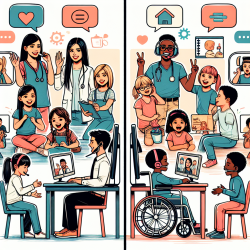Introduction
In the dynamic field of speech-language pathology, practitioners are increasingly called upon to address diverse health-related issues that impact communication and quality of life. One such area is the awareness and education surrounding sexually transmitted infections and diseases (STIs/STDs), particularly among women in Asia. A recent scoping review titled "Understanding Women’s Knowledge, Awareness, and Perceptions of STIs/STDs in Asia: A Scoping Review" provides valuable insights that can enhance practitioner skills and ultimately improve outcomes for affected populations.
Key Findings from the Research
The study conducted a comprehensive review of literature published between 2018 and 2022, focusing on the knowledge, awareness, and perceptions (KAP) of STIs/STDs among women in Asia. The findings revealed consistently low levels of knowledge and awareness across various cohorts, particularly among female commercial sex workers, women with lower educational levels, and those in poorer socioeconomic positions.
In South Asia, cultural, sociological, economic, and gender inequalities significantly impact KAP levels. The review underscores the need for targeted educational initiatives, especially for vulnerable groups such as sex workers, transgender women, pregnant women, and rural housewives.
Implications for Practitioners
As practitioners, understanding these findings can inform the development of targeted intervention strategies. Here are some actionable steps:
- Integrate Education into Therapy: Incorporate STI/STD awareness and education into therapy sessions, especially for clients from vulnerable groups. Use age-appropriate and culturally sensitive materials to enhance understanding.
- Collaborate with Community Resources: Partner with local health organizations and community leaders to facilitate workshops and seminars aimed at increasing awareness and knowledge about STIs/STDs.
- Advocate for Policy Changes: Use data-driven insights to advocate for policy changes that allocate more resources to educational initiatives targeting high-risk populations.
- Encourage Further Research: Encourage colleagues and students to conduct further research to fill gaps in knowledge and explore innovative ways to improve STI/STD education and prevention.
Conclusion
The review highlights the critical role of education in influencing health behavior and preventing STIs/STDs. By integrating these insights into practice, speech-language pathologists can play a pivotal role in empowering women and improving health outcomes. For practitioners looking to enhance their skills and impact, this research provides a robust foundation for informed action.
To read the original research paper, please follow this link: Understanding Women’s Knowledge, Awareness, and Perceptions of STIs/STDs in Asia: A Scoping Review.










